2023年冀教版中考英语一轮复习 第三课时 七年级下册(Unit 1~Unit 4)课件(共43张PPT)
文档属性
| 名称 | 2023年冀教版中考英语一轮复习 第三课时 七年级下册(Unit 1~Unit 4)课件(共43张PPT) | 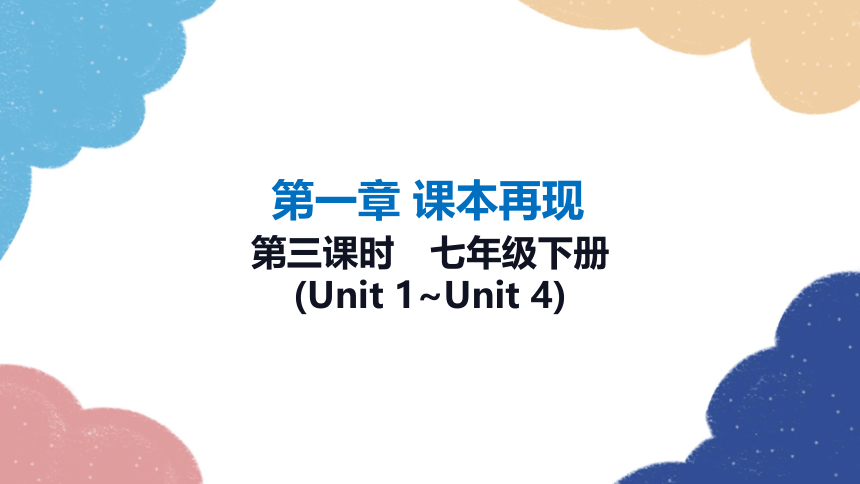 | |
| 格式 | pptx | ||
| 文件大小 | 485.5KB | ||
| 资源类型 | 教案 | ||
| 版本资源 | 冀教版 | ||
| 科目 | 英语 | ||
| 更新时间 | 2023-05-28 12:42:14 | ||
图片预览

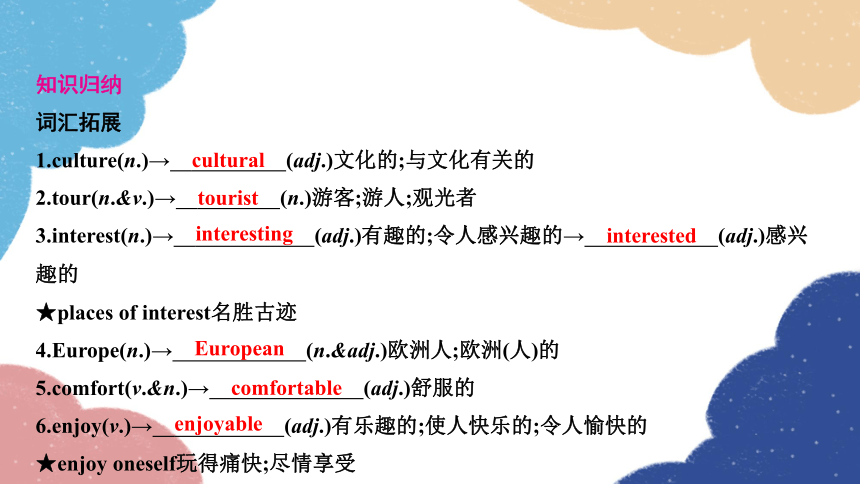
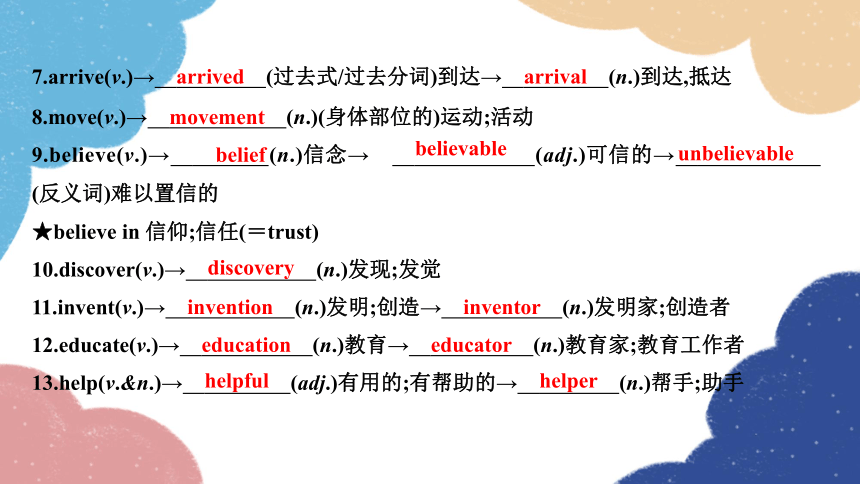
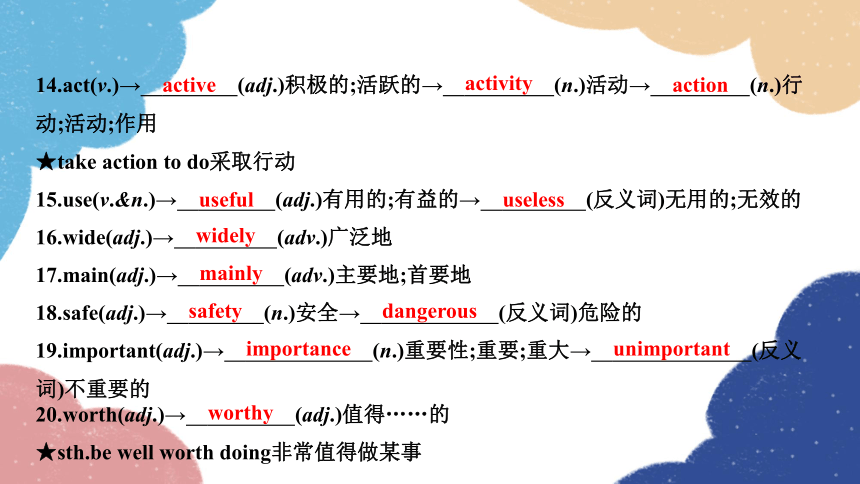
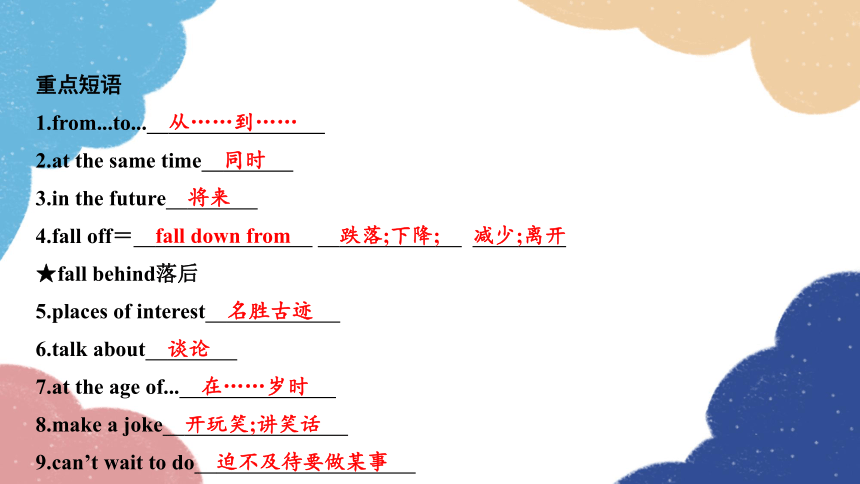
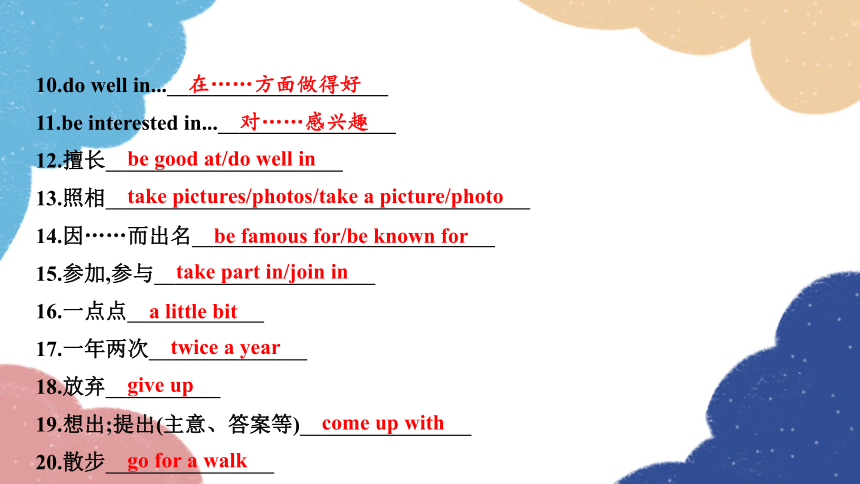
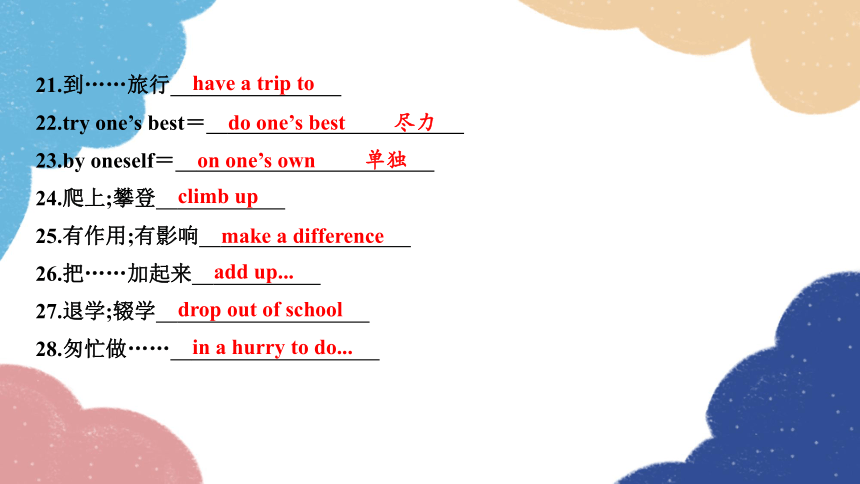
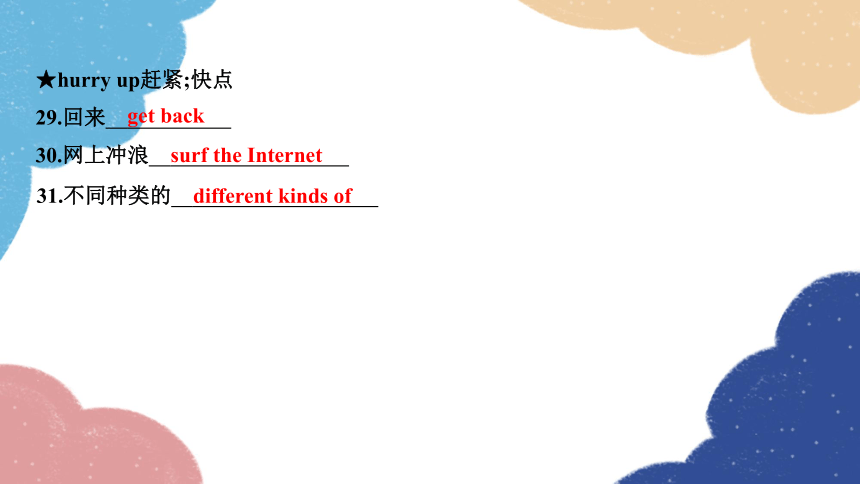
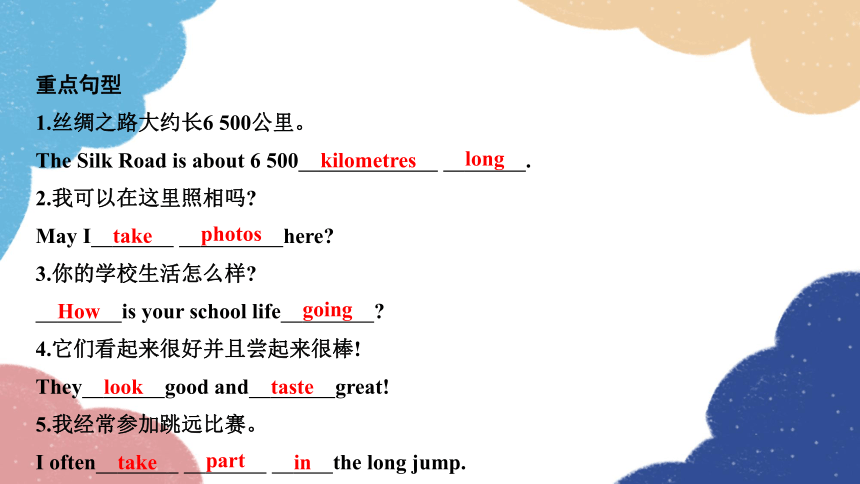
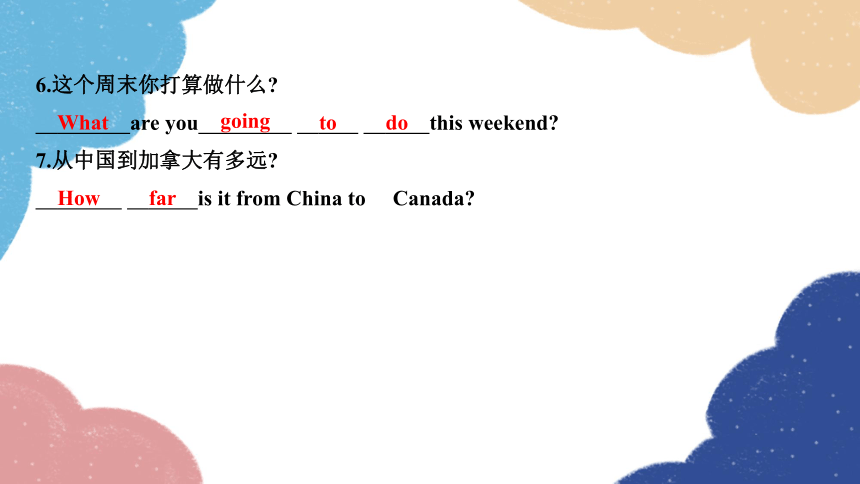
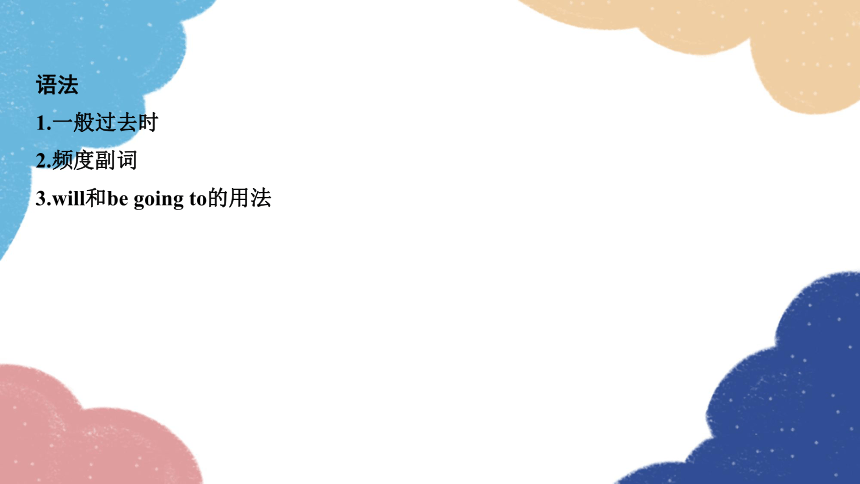
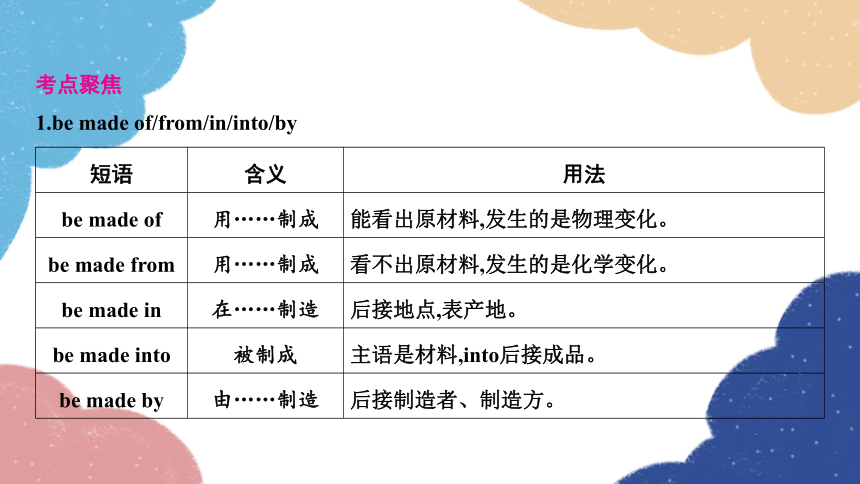
文档简介
(共43张PPT)
第三课时 七年级下册(Unit 1~Unit 4)
第一章 课本再现
知识归纳
词汇拓展
1.culture(n.)→ cultural (adj.)文化的;与文化有关的
2.tour(n.&v.)→ tourist (n.)游客;游人;观光者
3.interest(n.)→ interesting (adj.)有趣的;令人感兴趣的→ interested (adj.)感兴趣的
★places of interest名胜古迹
4.Europe(n.)→ European (n.&adj.)欧洲人;欧洲(人)的
5.comfort(v.&n.)→ comfortable (adj.)舒服的
6.enjoy(v.)→ enjoyable (adj.)有乐趣的;使人快乐的;令人愉快的
★enjoy oneself玩得痛快;尽情享受
cultural
tourist
interesting
interested
European
comfortable
enjoyable
7.arrive(v.)→ arrived (过去式/过去分词)到达→ arrival (n.)到达,抵达
arrived
arrival
8.move(v.)→ movement (n.)(身体部位的)运动;活动
9.believe(v.)→ belief (n.)信念→ believable (adj.)可信的→ unbelievable (反义词)难以置信的
★believe in 信仰;信任(=trust)
10.discover(v.)→ discovery (n.)发现;发觉
11.invent(v.)→ invention (n.)发明;创造→ inventor (n.)发明家;创造者
12.educate(v.)→ education (n.)教育→ educator (n.)教育家;教育工作者
13.help(v.&n.)→ helpful (adj.)有用的;有帮助的→ helper (n.)帮手;助手
movement
belief
believable
unbelievable
discovery
invention
inventor
education
educator
helpful
helper
14.act(v.)→ active (adj.)积极的;活跃的→ activity (n.)活动→ action (n.)行动;活动;作用
★take action to do采取行动
15.use(v.&n.)→ useful (adj.)有用的;有益的→ useless (反义词)无用的;无效的
16.wide(adj.)→ widely (adv.)广泛地
17.main(adj.)→ mainly (adv.)主要地;首要地
18.safe(adj.)→ safety (n.)安全→ dangerous (反义词)危险的
19.important(adj.)→ importance (n.)重要性;重要;重大→ unimportant (反义词)不重要的
active
activity
action
useful
useless
widely
mainly
safety
dangerous
importance
unimportant
20.worth(adj.)→ worthy (adj.)值得……的
★sth.be well worth doing非常值得做某事
worthy
重点短语
1.from...to... 从……到……
2.at the same time 同时
3.in the future 将来
4.fall off= fall down from 跌落;下降; 减少;离开
★fall behind落后
5.places of interest 名胜古迹
6.talk about 谈论
7.at the age of... 在……岁时
8.make a joke 开玩笑;讲笑话
9.can’t wait to do 迫不及待要做某事
从……到……
同时
将来
fall down from
跌落;下降;
减少;离开
名胜古迹
谈论
在……岁时
开玩笑;讲笑话
迫不及待要做某事
10.do well in... 在……方面做得好
11.be interested in... 对……感兴趣
12.擅长 be good at/do well in
13.照相 take pictures/photos/take a picture/photo
14.因……而出名 be famous for/be known for
15.参加,参与 take part in/join in
16.一点点 a little bit
17.一年两次 twice a year
18.放弃 give up
19.想出;提出(主意、答案等) come up with
20.散步 go for a walk
在……方面做得好
对……感兴趣
be good at/do well in
take pictures/photos/take a picture/photo
be famous for/be known for
take part in/join in
a little bit
twice a year
give up
come up with
go for a walk
21.到……旅行 have a trip to
22.try one’s best= do one’s best 尽力
23.by oneself= on one’s own 单独
24.爬上;攀登 climb up
25.有作用;有影响 make a difference
26.把……加起来 add up...
27.退学;辍学 drop out of school
28.匆忙做…… in a hurry to do...
have a trip to
do one’s best 尽力
on one’s own 单独
climb up
make a difference
add up...
drop out of school
in a hurry to do...
31.不同种类的 different kinds of
different kinds of
★hurry up赶紧;快点
29.回来 get back
30.网上冲浪 surf the Internet
get back
surf the Internet
重点句型
1.丝绸之路大约长6 500公里。
The Silk Road is about 6 500 kilometres long .
2.我可以在这里照相吗
May I take photos here
3.你的学校生活怎么样
How is your school life going
4.它们看起来很好并且尝起来很棒!
They look good and taste great!
5.我经常参加跳远比赛。
I often take part in the long jump.
kilometres
long
take
photos
How
going
look
taste
take
part
in
6.这个周末你打算做什么
What are you going to do this weekend
7.从中国到加拿大有多远
How far is it from China to Canada
What
going
to
do
How
far
语法
1.一般过去时
2.频度副词
3.will和be going to的用法
考点聚焦
1.be made of/from/in/into/by
短语 含义 用法
be made of 用……制成 能看出原材料,发生的是物理变化。
be made from 用……制成 看不出原材料,发生的是化学变化。
be made in 在……制造 后接地点,表产地。
be made into 被制成 主语是材料,into后接成品。
be made by 由……制造 后接制造者、制造方。
( A ) ①The computers which are made China sell well.
A.by B.in C.from D.of
( A )②I’d like to introduce my class rules made us all.
A.by B.from C.in D.of
( D )③The buildings which are made stones are really strong.
A.by B.from C.in D.of
( C )④It’s well-known that the butter is made cream or milk.
A.by B.of C.from D.in
A
D
C
B
2.arrive
arrive为不及物动词,意为“到达”。arrive后接宾语时,需加介词in(大地点)或at(小地点)。
eg:Jack always arrives at the top first when we climb the hill on Sundays.我们星期天爬山时Jack总是最先到达山顶。
arrive是终止性动词,不能与表示时间长短的状语连用。
arrive,reach与get to
词汇 意思 用法
arrive 到达…… 后接地点名词作宾语时,需加介词in(大地点)或at(小地点)。若其后出现here/there等副词时,要省略介词。
reach 及物动词,后直接接地点名词。
get to 直接接地点名词,若其后接地点副词时需省略to。
eg:Tom arrived in London on the evening ofJuly 1st.
Tom是在7月1日晚上到达伦敦的。
When did you reach Lanzhou
你是什么时候到达兰州的
How can I get there
我怎样能到达那里
①你可以先到北京,然后乘火车去西安。
You can arrive in / get to Beijing first and then take a train to Xi’an.
②I will reach Shanghai next week.(改为同义句)
I will arrive in / get to Shanghai next week.
( C )③—Who the station on time
—I did.In fact,I there 5 minutes earlier.
A.got;reached B.arrived;got to
C.reached;arrived D.got to;arrived at
arrive
in
get
to
arrive
in
get
to
C
3.invent
invent为及物动词,意为“发明;创造”。
eg:Who invented the telephone
谁发明了电话
invent与discover
单词 意思 用法
invent 发明 经过思考把世界上本来没有的东西创造出来。
discover 发现 通过努力把世界上已存在的东西找出来。
eg:The Wright Brothers invented the plane.莱特兄弟发明了飞机。
Columbus discovered America in 1492.
哥伦布于1492年发现了美洲。
( D )①I don’t know who the plane.
A.discovers B.invents
C.discovered D.invented
( A )②Most people think the telephone was by Alexander Graham Bell
in 1876.
A.invented B.found
C.created D.discovered
D
A
4.be good at,be good for,be good to与be good with
(1)be good at意为“擅长”,后接名词或动词-ing形式,相当于do well in。
(2)be good for意为“对……有好处”,反义短语为be bad for,意为“对……有害”。
(3)be good to意为“对……友好”,同义短语为be kind/friendly to。
(4)be good with意为“与……相处得好;善于应付……的”,同义短语为get on/along well with。
①看太多电视对你的眼睛没有好处。
Watching TV too much isn’t good for your eyes.
( C )②I’m good at .I want to join the music club.
A.sing B.sings C.singing D.sang
③他对付孩子有一套。
He is very good with children.
good
for
C
good with
5.interest
(1)作名词,意为“兴趣”。常用短语have an interest in,意为“对……感兴趣”。
eg:By that time I had lost interest in the idea.那时我已经对此想法失去兴趣了。
(2)作及物动词,意为“使……感兴趣”。其形容词为interesting(有趣的)和interested(感兴趣的)。常用短语be interested in,意为“对……感兴趣”。
eg:This film interests me a lot.
这部电影使我很感兴趣。
interesting与interested
单词 用法 例句
interesting adj. 修饰物 This is an interesting book.
这是一本有趣的书。
interested adj. 修饰人 I am interested in playing football.
我对踢足球感兴趣。
( C )①I have to tell you.Maybe you will be in it.
A.interesting something;interested
B.something interesting;interesting
C.something interesting;interested
D.interesting something;interesting
( C )②I do well in math because I am in it.
A.interest B.interesting
C.interested D.interests
C
C
6.have fun
have fun意为“玩得开心;过得愉快”,其中fun是不可数名词,后常接动词-ing形式,相当于have a good time或enjoy oneself。
eg:We were in Qingdao last week and had great fun there.
上周我们在青岛玩得很开心。
“It’s fun to do sth.”是固定句式,意为“做某事很有趣”,其中it是形式主语,不定式短语为真正的主语。
( A )①The boys are going to have fun pictures.
A.drawing B.to draw
C.draw D.drew
②We had a good time at the party yesterday.(改为同义句)
We had fun / enjoyed ourselves at the party yesterday.
A
had
fun
enjoyed
ourselves
7.How far is it from Beijing to Xi’an 从北京到西安有多远
how far意为“多远”,用来询问两地之间的距离。常用句型为“How far is it from...to... ”,意为“从……到……多远 ”。
eg:How far is it from your home to school
从你家到学校多远
( A )①— is it from your home to school
—It’s about 30 minutes’ walk.
A.How far B.How long
C.How often
②从这个村子到你们学校有多远
How far is it from this village to your school
8.How is your school life going 你(们)的学校生活怎么样
“How is...going ”意为“……怎么样 ”,也可以直接说“How is... ”,是常用的问候用语,答语常用“Very/Pretty good(很好)./Fine(不错)./It’s great(很好)./Terrible(不好).”等。
A
from
to
( C )①—How is your school life going
— .
A.You are welcome B.Thanks
C.It’s great D.That is right
C
( C )②—
—Well,I am a little busy this weekend.
A.What do you do this weekend
B.How was your weekend
C.How is your weekend going
D.How do you do this weekend
C
五年中考
一、单项选择
( B )1.(2022·省卷)Paper in ancient China more than 2 000 years ago.
A.invented B.was invented
C.invent D.is invented
( D )2.(2022·省卷)— do you exercise
—Every day.
A.How long B.Why
C.What time D.How often
B
D
( A )3.(2022·甘南州)— does Tina go to the library
—She goes there twice a week.
A.How often B.How soon C.How far
( C )4.(2022·甘南州)Welcome you all to Gannan and enjoy here.
A.you B.your C.yourselves
( A )5.(2021·甘南州)—How is the film
—Oh,it’s well worth twice.
A.seeing B.to see C.saw
A
C
A
( D )6.(2019·省卷)—
—At least three times.
A.How much do you pay for Treasure Island
B.How often have you read Treasure Island
C.How long does it take you to finish reading Treasure Island
D.How many times have you read Treasure Island
( B )7.(2019·兰州)We gave away books to the school library last year.
A.six thousands B.six thousand
C.six thousands of D.six thousand of
D
B
( B )8.(2019·兰州)— is it from Lanzhou to Lhasa
—It’s about 2 160 kilometres.
A.How often B.How far
C.How long D.How many
( B )9.(2018·兰州)— times have you visited Gansu Science Museum
—Only once.
A.How often B.How many
C.How long D.How soon
B
B
二、用所给词的适当形式填空
1.(2022·省卷)There was (be) a lot of rain outside last night.
2.(2022·省卷)Young children should not be left by themselves (they).
3.(2022·省卷)More and more young people enjoy reading (read) poems.
4.(2022·甘南州改编)Zhong Nanshan is widely (wide) known as a famous Chinese doctor all over the world.
5.(2021·省卷)George walked into the room and turned (turn) on the light.
6.(2021·兰州)Aunt Li asked (ask) me to help her feed the chickens last week.
7.(2021·兰州)I usually (usual) watch movies to make me relaxed.
was
themselves
reading
widely
turned
asked
usually
三、按要求完成句子
1.(2022·甘南州)这些衣服是中国制造的。
These clothes are made in China.
2.(2020·天水)It is 30-minute ride from my home to my school.(对画线部分提问)
How far is it from your home to your school
3.(2019·兰州)许多次我都想放弃,但我奋力坚持了下来。
Many times I thought about giving up ,but I fought on.
made in
How far
giving
up
备考演练
一、单项选择
( C )1.(2022·江苏泰州)— is China Tiangong space station from us
—About 400 kilometres above the earth.
A.How much B.How often
C.How far D.How long
( B )2.(2022·湖南湘西州)It only takes us two hours to go from Jishou to Changsha by train when Zhang-Ji-Huai high-speed railway in December last year.
A.opens B.opened C.will open
C
B
( B )3.(2022·天津)Although he failed many times,he gave up his dream.
A.nearly B.never C.often D.always
( D )4.(2022·新疆)Poems influence people a lot. ,the poems of Bai Juyi are still meaningful today.
A.In the end B.From now on
C.At first D.For example
B
D
( D )5.(2022·辽宁大连)—What’s your plan for the weekend,Helen
—I my grandparents.
A.visit B.visited
C.have visited D.am going to visit
( D )6.(2022·安徽)—Do you know the spacewoman Wang Yaping
—Sure.She is called the mother who the stars.
A.gave out B.put away
C.looked after D.reached for
D
D
( B )7.(2022·湖北恩施州)—Dear,new term is coming.I’ve bought a Chinese-English
dictionary for you.
—Thanks.I think it is to me.
A.colourful B.helpful C.successful
( A )8.(2022·湖南株洲)Mary is a book lover.She could read by at the age of five.
A.herself B.himself
C.themselves
B
A
( B )9.(2022·广西贵港)Jim is a funny boy.He is good telling jokes.
A.with B.at C.for D.of
B
二、用所给词的适当形式填空
1.(2022·辽宁大连)Mum,why not make some zongzi by ourselves (our) today
2.(2022·四川广安改编)Computers were invented (invent) not long ago,but they are popular now.
3.(2022·广西贺州改编)Sally thinks thenews is more educational (education) than the sitcom.
4.(2022·黑龙江龙东地区)The spirit of Lei Feng is worth spreading (spread) forever.
5.(2022·新疆改编)They are such interesting books that we all enjoy reading (read) them.
ourselves
invented
educational
spreading
reading
第三课时 七年级下册(Unit 1~Unit 4)
第一章 课本再现
知识归纳
词汇拓展
1.culture(n.)→ cultural (adj.)文化的;与文化有关的
2.tour(n.&v.)→ tourist (n.)游客;游人;观光者
3.interest(n.)→ interesting (adj.)有趣的;令人感兴趣的→ interested (adj.)感兴趣的
★places of interest名胜古迹
4.Europe(n.)→ European (n.&adj.)欧洲人;欧洲(人)的
5.comfort(v.&n.)→ comfortable (adj.)舒服的
6.enjoy(v.)→ enjoyable (adj.)有乐趣的;使人快乐的;令人愉快的
★enjoy oneself玩得痛快;尽情享受
cultural
tourist
interesting
interested
European
comfortable
enjoyable
7.arrive(v.)→ arrived (过去式/过去分词)到达→ arrival (n.)到达,抵达
arrived
arrival
8.move(v.)→ movement (n.)(身体部位的)运动;活动
9.believe(v.)→ belief (n.)信念→ believable (adj.)可信的→ unbelievable (反义词)难以置信的
★believe in 信仰;信任(=trust)
10.discover(v.)→ discovery (n.)发现;发觉
11.invent(v.)→ invention (n.)发明;创造→ inventor (n.)发明家;创造者
12.educate(v.)→ education (n.)教育→ educator (n.)教育家;教育工作者
13.help(v.&n.)→ helpful (adj.)有用的;有帮助的→ helper (n.)帮手;助手
movement
belief
believable
unbelievable
discovery
invention
inventor
education
educator
helpful
helper
14.act(v.)→ active (adj.)积极的;活跃的→ activity (n.)活动→ action (n.)行动;活动;作用
★take action to do采取行动
15.use(v.&n.)→ useful (adj.)有用的;有益的→ useless (反义词)无用的;无效的
16.wide(adj.)→ widely (adv.)广泛地
17.main(adj.)→ mainly (adv.)主要地;首要地
18.safe(adj.)→ safety (n.)安全→ dangerous (反义词)危险的
19.important(adj.)→ importance (n.)重要性;重要;重大→ unimportant (反义词)不重要的
active
activity
action
useful
useless
widely
mainly
safety
dangerous
importance
unimportant
20.worth(adj.)→ worthy (adj.)值得……的
★sth.be well worth doing非常值得做某事
worthy
重点短语
1.from...to... 从……到……
2.at the same time 同时
3.in the future 将来
4.fall off= fall down from 跌落;下降; 减少;离开
★fall behind落后
5.places of interest 名胜古迹
6.talk about 谈论
7.at the age of... 在……岁时
8.make a joke 开玩笑;讲笑话
9.can’t wait to do 迫不及待要做某事
从……到……
同时
将来
fall down from
跌落;下降;
减少;离开
名胜古迹
谈论
在……岁时
开玩笑;讲笑话
迫不及待要做某事
10.do well in... 在……方面做得好
11.be interested in... 对……感兴趣
12.擅长 be good at/do well in
13.照相 take pictures/photos/take a picture/photo
14.因……而出名 be famous for/be known for
15.参加,参与 take part in/join in
16.一点点 a little bit
17.一年两次 twice a year
18.放弃 give up
19.想出;提出(主意、答案等) come up with
20.散步 go for a walk
在……方面做得好
对……感兴趣
be good at/do well in
take pictures/photos/take a picture/photo
be famous for/be known for
take part in/join in
a little bit
twice a year
give up
come up with
go for a walk
21.到……旅行 have a trip to
22.try one’s best= do one’s best 尽力
23.by oneself= on one’s own 单独
24.爬上;攀登 climb up
25.有作用;有影响 make a difference
26.把……加起来 add up...
27.退学;辍学 drop out of school
28.匆忙做…… in a hurry to do...
have a trip to
do one’s best 尽力
on one’s own 单独
climb up
make a difference
add up...
drop out of school
in a hurry to do...
31.不同种类的 different kinds of
different kinds of
★hurry up赶紧;快点
29.回来 get back
30.网上冲浪 surf the Internet
get back
surf the Internet
重点句型
1.丝绸之路大约长6 500公里。
The Silk Road is about 6 500 kilometres long .
2.我可以在这里照相吗
May I take photos here
3.你的学校生活怎么样
How is your school life going
4.它们看起来很好并且尝起来很棒!
They look good and taste great!
5.我经常参加跳远比赛。
I often take part in the long jump.
kilometres
long
take
photos
How
going
look
taste
take
part
in
6.这个周末你打算做什么
What are you going to do this weekend
7.从中国到加拿大有多远
How far is it from China to Canada
What
going
to
do
How
far
语法
1.一般过去时
2.频度副词
3.will和be going to的用法
考点聚焦
1.be made of/from/in/into/by
短语 含义 用法
be made of 用……制成 能看出原材料,发生的是物理变化。
be made from 用……制成 看不出原材料,发生的是化学变化。
be made in 在……制造 后接地点,表产地。
be made into 被制成 主语是材料,into后接成品。
be made by 由……制造 后接制造者、制造方。
( A ) ①The computers which are made China sell well.
A.by B.in C.from D.of
( A )②I’d like to introduce my class rules made us all.
A.by B.from C.in D.of
( D )③The buildings which are made stones are really strong.
A.by B.from C.in D.of
( C )④It’s well-known that the butter is made cream or milk.
A.by B.of C.from D.in
A
D
C
B
2.arrive
arrive为不及物动词,意为“到达”。arrive后接宾语时,需加介词in(大地点)或at(小地点)。
eg:Jack always arrives at the top first when we climb the hill on Sundays.我们星期天爬山时Jack总是最先到达山顶。
arrive是终止性动词,不能与表示时间长短的状语连用。
arrive,reach与get to
词汇 意思 用法
arrive 到达…… 后接地点名词作宾语时,需加介词in(大地点)或at(小地点)。若其后出现here/there等副词时,要省略介词。
reach 及物动词,后直接接地点名词。
get to 直接接地点名词,若其后接地点副词时需省略to。
eg:Tom arrived in London on the evening ofJuly 1st.
Tom是在7月1日晚上到达伦敦的。
When did you reach Lanzhou
你是什么时候到达兰州的
How can I get there
我怎样能到达那里
①你可以先到北京,然后乘火车去西安。
You can arrive in / get to Beijing first and then take a train to Xi’an.
②I will reach Shanghai next week.(改为同义句)
I will arrive in / get to Shanghai next week.
( C )③—Who the station on time
—I did.In fact,I there 5 minutes earlier.
A.got;reached B.arrived;got to
C.reached;arrived D.got to;arrived at
arrive
in
get
to
arrive
in
get
to
C
3.invent
invent为及物动词,意为“发明;创造”。
eg:Who invented the telephone
谁发明了电话
invent与discover
单词 意思 用法
invent 发明 经过思考把世界上本来没有的东西创造出来。
discover 发现 通过努力把世界上已存在的东西找出来。
eg:The Wright Brothers invented the plane.莱特兄弟发明了飞机。
Columbus discovered America in 1492.
哥伦布于1492年发现了美洲。
( D )①I don’t know who the plane.
A.discovers B.invents
C.discovered D.invented
( A )②Most people think the telephone was by Alexander Graham Bell
in 1876.
A.invented B.found
C.created D.discovered
D
A
4.be good at,be good for,be good to与be good with
(1)be good at意为“擅长”,后接名词或动词-ing形式,相当于do well in。
(2)be good for意为“对……有好处”,反义短语为be bad for,意为“对……有害”。
(3)be good to意为“对……友好”,同义短语为be kind/friendly to。
(4)be good with意为“与……相处得好;善于应付……的”,同义短语为get on/along well with。
①看太多电视对你的眼睛没有好处。
Watching TV too much isn’t good for your eyes.
( C )②I’m good at .I want to join the music club.
A.sing B.sings C.singing D.sang
③他对付孩子有一套。
He is very good with children.
good
for
C
good with
5.interest
(1)作名词,意为“兴趣”。常用短语have an interest in,意为“对……感兴趣”。
eg:By that time I had lost interest in the idea.那时我已经对此想法失去兴趣了。
(2)作及物动词,意为“使……感兴趣”。其形容词为interesting(有趣的)和interested(感兴趣的)。常用短语be interested in,意为“对……感兴趣”。
eg:This film interests me a lot.
这部电影使我很感兴趣。
interesting与interested
单词 用法 例句
interesting adj. 修饰物 This is an interesting book.
这是一本有趣的书。
interested adj. 修饰人 I am interested in playing football.
我对踢足球感兴趣。
( C )①I have to tell you.Maybe you will be in it.
A.interesting something;interested
B.something interesting;interesting
C.something interesting;interested
D.interesting something;interesting
( C )②I do well in math because I am in it.
A.interest B.interesting
C.interested D.interests
C
C
6.have fun
have fun意为“玩得开心;过得愉快”,其中fun是不可数名词,后常接动词-ing形式,相当于have a good time或enjoy oneself。
eg:We were in Qingdao last week and had great fun there.
上周我们在青岛玩得很开心。
“It’s fun to do sth.”是固定句式,意为“做某事很有趣”,其中it是形式主语,不定式短语为真正的主语。
( A )①The boys are going to have fun pictures.
A.drawing B.to draw
C.draw D.drew
②We had a good time at the party yesterday.(改为同义句)
We had fun / enjoyed ourselves at the party yesterday.
A
had
fun
enjoyed
ourselves
7.How far is it from Beijing to Xi’an 从北京到西安有多远
how far意为“多远”,用来询问两地之间的距离。常用句型为“How far is it from...to... ”,意为“从……到……多远 ”。
eg:How far is it from your home to school
从你家到学校多远
( A )①— is it from your home to school
—It’s about 30 minutes’ walk.
A.How far B.How long
C.How often
②从这个村子到你们学校有多远
How far is it from this village to your school
8.How is your school life going 你(们)的学校生活怎么样
“How is...going ”意为“……怎么样 ”,也可以直接说“How is... ”,是常用的问候用语,答语常用“Very/Pretty good(很好)./Fine(不错)./It’s great(很好)./Terrible(不好).”等。
A
from
to
( C )①—How is your school life going
— .
A.You are welcome B.Thanks
C.It’s great D.That is right
C
( C )②—
—Well,I am a little busy this weekend.
A.What do you do this weekend
B.How was your weekend
C.How is your weekend going
D.How do you do this weekend
C
五年中考
一、单项选择
( B )1.(2022·省卷)Paper in ancient China more than 2 000 years ago.
A.invented B.was invented
C.invent D.is invented
( D )2.(2022·省卷)— do you exercise
—Every day.
A.How long B.Why
C.What time D.How often
B
D
( A )3.(2022·甘南州)— does Tina go to the library
—She goes there twice a week.
A.How often B.How soon C.How far
( C )4.(2022·甘南州)Welcome you all to Gannan and enjoy here.
A.you B.your C.yourselves
( A )5.(2021·甘南州)—How is the film
—Oh,it’s well worth twice.
A.seeing B.to see C.saw
A
C
A
( D )6.(2019·省卷)—
—At least three times.
A.How much do you pay for Treasure Island
B.How often have you read Treasure Island
C.How long does it take you to finish reading Treasure Island
D.How many times have you read Treasure Island
( B )7.(2019·兰州)We gave away books to the school library last year.
A.six thousands B.six thousand
C.six thousands of D.six thousand of
D
B
( B )8.(2019·兰州)— is it from Lanzhou to Lhasa
—It’s about 2 160 kilometres.
A.How often B.How far
C.How long D.How many
( B )9.(2018·兰州)— times have you visited Gansu Science Museum
—Only once.
A.How often B.How many
C.How long D.How soon
B
B
二、用所给词的适当形式填空
1.(2022·省卷)There was (be) a lot of rain outside last night.
2.(2022·省卷)Young children should not be left by themselves (they).
3.(2022·省卷)More and more young people enjoy reading (read) poems.
4.(2022·甘南州改编)Zhong Nanshan is widely (wide) known as a famous Chinese doctor all over the world.
5.(2021·省卷)George walked into the room and turned (turn) on the light.
6.(2021·兰州)Aunt Li asked (ask) me to help her feed the chickens last week.
7.(2021·兰州)I usually (usual) watch movies to make me relaxed.
was
themselves
reading
widely
turned
asked
usually
三、按要求完成句子
1.(2022·甘南州)这些衣服是中国制造的。
These clothes are made in China.
2.(2020·天水)It is 30-minute ride from my home to my school.(对画线部分提问)
How far is it from your home to your school
3.(2019·兰州)许多次我都想放弃,但我奋力坚持了下来。
Many times I thought about giving up ,but I fought on.
made in
How far
giving
up
备考演练
一、单项选择
( C )1.(2022·江苏泰州)— is China Tiangong space station from us
—About 400 kilometres above the earth.
A.How much B.How often
C.How far D.How long
( B )2.(2022·湖南湘西州)It only takes us two hours to go from Jishou to Changsha by train when Zhang-Ji-Huai high-speed railway in December last year.
A.opens B.opened C.will open
C
B
( B )3.(2022·天津)Although he failed many times,he gave up his dream.
A.nearly B.never C.often D.always
( D )4.(2022·新疆)Poems influence people a lot. ,the poems of Bai Juyi are still meaningful today.
A.In the end B.From now on
C.At first D.For example
B
D
( D )5.(2022·辽宁大连)—What’s your plan for the weekend,Helen
—I my grandparents.
A.visit B.visited
C.have visited D.am going to visit
( D )6.(2022·安徽)—Do you know the spacewoman Wang Yaping
—Sure.She is called the mother who the stars.
A.gave out B.put away
C.looked after D.reached for
D
D
( B )7.(2022·湖北恩施州)—Dear,new term is coming.I’ve bought a Chinese-English
dictionary for you.
—Thanks.I think it is to me.
A.colourful B.helpful C.successful
( A )8.(2022·湖南株洲)Mary is a book lover.She could read by at the age of five.
A.herself B.himself
C.themselves
B
A
( B )9.(2022·广西贵港)Jim is a funny boy.He is good telling jokes.
A.with B.at C.for D.of
B
二、用所给词的适当形式填空
1.(2022·辽宁大连)Mum,why not make some zongzi by ourselves (our) today
2.(2022·四川广安改编)Computers were invented (invent) not long ago,but they are popular now.
3.(2022·广西贺州改编)Sally thinks thenews is more educational (education) than the sitcom.
4.(2022·黑龙江龙东地区)The spirit of Lei Feng is worth spreading (spread) forever.
5.(2022·新疆改编)They are such interesting books that we all enjoy reading (read) them.
ourselves
invented
educational
spreading
reading
